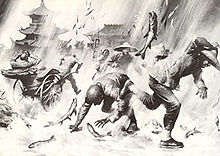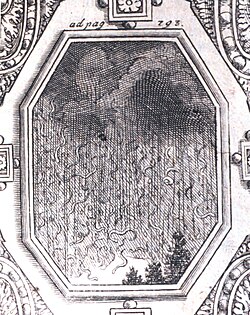Mvua ya wanyama
Mvua ya wanyama ni tukio la nadra sana ambapo wanyama wadogo huanguka kutoka angani.


Matukio kama hayo yameripotiwa mara kwa mara katika nchi nyingi katika historia. [1] Wanyama wanaotajwa katika matukio hayo ni hasa samaki, chura na ndege.
Taarifa ziko nyingi kiasi kwamba wataalamu wanakubali ni kweli lakini hadi sasa haikuwezakana kuzifanyia utafiti kamili[2].
Kati ya maelezo yaliyopendekezwa kuna dhana kwamba vimbunga vinaweza kuchukua viumbehai kama vile samaki au vyura, na kuwainua juu hadi kilomita kadhaa. [3] [4]
Historia
haririMvua ya wanyama wasioweza kuruka imeripotiwa katika historia. [3]
Katika karne ya 1 BK, mtaalamu wa Kiroma Plinio Mzee aliandika kuhusu mvua ya vyura na samaki. [5]
Mnamo 1794, askari wa Kifaransa walileta taarifa kuhusu vyura wakianguka kutoka angani wakati wa mvua kubwa huko Lalain, karibu na mji wa Lille, Ufaransa. [6]
Wakazi wa kijiji cha Yoro nchini Honduras wanadai 'mvua ya samaki' hutokea huko kila majira ya kiangazi, jambo wanaloliita kwa Kihispania Lluvia de Peces. [7]
Maelezo
haririJaribio la kueleza matukio hayo kwa njia ya kisayansi linahusisha vimbunga vinavyotokea juu ya eneo la maji kama vile bahari au ziwa. [3] [8] [9] [10] Kufuatana na nadharia tete hiyo, kimbunga kinavuta vitu vidogo juu na kuviinua hadi umbali mkubwa. Kwa hiyo kama samaki au chura wako kwenye uso wa maji, wanaweza kuathiriwa.
Nadharia tete hiyo inalingana na taarifa kwamba wanyama wepesi na wadogo wanaoishi kwenye maji ndio wanaopatikana zaidi katika mvua ya aina hiyo. [11]
Lakini hakuna maelezo bado kwa nini mara nyingi wanyama wa spishi moja tu ndio wanaoathiriwa, badala ya wanyama mbalimbali kutoka eneo moja.[12]
Kama ni ndege wanaoanguka, dhoruba inaweza kukuta kundi la ndege hewani hasa wakati wa kuhama. Matukio hayo yanaweza kutokea kwa ndege, ambao wanaweza kuuawa ilhali wako hewani, au kupigwa na butwaa na kisha kuanguka.
Marejeo
hariri- ↑ "Can it rain frogs, fish or other objects". Library of Congress. Agosti 26, 2010.
{{cite web}}: CS1 maint: date auto-translated (link) - ↑ When It Rains Animals: The Science of True Weather Weirdness Ilihifadhiwa 1 Julai 2020 kwenye Wayback Machine.. Alasdair Wilkins. March 21, 2012.
- ↑ 3.0 3.1 3.2 "Can it rain frogs, fish or other objects". Library of Congress. Agosti 26, 2010.
{{cite web}}: CS1 maint: date auto-translated (link)"Can it rain frogs, fish or other objects". Library of Congress. August 26, 2010. - ↑ How can it rain fish? BBC News 20 August 2004.
- ↑ "How can it rain fish?". Agosti 20, 2004.
{{cite web}}: CS1 maint: date auto-translated (link) - ↑ Hasler, Joe. "Weird Stories of Objects Falling From the Sky - Explained". www.popularmechanics.com. Iliwekwa mnamo 31 Oktoba 2017.
{{cite web}}: CS1 maint: date auto-translated (link) - ↑ Rivas, Orsy Campos (Novemba 7, 2004). "Lo que la lluvia regala a Yoro (discusses a rain of fishes that occurs annually in Honduras)". Hablemos.
{{cite web}}: CS1 maint: date auto-translated (link) - ↑ Strange Rain: Why Fish, Frogs and Golf Balls Fall From the Skies. Sarah Zielinski, Smithsonian Magazine. 8 September 2015.
- ↑ What is animal rain phenomenon and how is it explained? Ilihifadhiwa 1 Oktoba 2020 kwenye Wayback Machine.. World Weather Online. 19 August 2014.
- ↑ When It Rains Animals: The Science of True Weather Weirdness Ilihifadhiwa 18 Septemba 2018 kwenye Wayback Machine.. Alasdair Wilkins, iO9. 21 March 2012.
- ↑ "Wiltshire weather", July 15, 2003.
- ↑ When Animals Rain From The Sky. Scribol.
Kujisomea zaidi
hariri- Bajkov, A.D. Do fish fall from the sky? Science, v. 109, April 22, 1949: 402.
- Bourchier, Daniel. “It’s raining fish…no really.” Sunday Territorian, Australia, February 28, 2010.
- Branley, Franklyn M. It's raining cats and dogs: all kinds of weather and why we have it. Illustrated by True Kelley. Boston, Houghton Mifflin, 1987. 112 p. (Juvenile)
- Cerveny, Randall S. Freaks of the storm: from flying cows to stealing thunder, the world's strangest true weather stories. New York, Thunder's Mouth Press, c2006. 371 p.
- Chandler, Barb. Froggy weather. Weather-wise, v. 57, Jan./Feb. 2004: 42.
- Christian, Spencer and Antonia Felix. Can it really rain frogs?: the world's strangest weather events. New York, Wiley, 1997. 121 p. (Juvenile).
- Corliss, William. Tornados, dark days, anomalous precipitation, and related weather phenomena: a catalog of geophysical anomalies. Glen Arm, MD: Sourcebook Project, c1983. 196 p.
- Dennis, Jerry. It's raining frogs and fishes: four seasons of natural phenomena and oddities of the sky. New York, HarperCollins, c1992. 323 p.
- Englebert, Phillis. The complete weather resource. Detroit, UXL, c1997-2000. 4 v.
- “Frogs fall from the sky.” Herald Sun, Melbourne, Australia, June 8, 2005. p. 2.
- Gray, J. E. The shower of fishes. Zoologist; a monthly journal of natural history, v. 17, 1859: 6540-41
- Gudger, E. W. Do fish fall from the sky with rain? Scientific Monthly, v. 29, December 1929: 523-527.
- McAtee, Waldo L. Showers of organic matter. Monthly Weather Review, v. 45, May 1917: 217-224.
- Posey, Carl A. The living earth book of wind and weather. Pleasantville, NY, Reader's Digest Association, c1994. 224 p.
- Waterspouts. In McGraw-Hill concise encyclopedia of science and technology. 5th edition. New York, McGraw-Hill, c2005. p. 2369-2370.
Viungo vya nje
hariri- Raining cats and dogs Ilihifadhiwa 9 Februari 2006 kwenye Wayback Machine.
- Mysterious Falls from the Sky Ilihifadhiwa 8 Januari 2008 kwenye Wayback Machine.. A review on the American perspective.
- 10 Craziest Things To Fall From the Sky
- It rained fish over a Texas town this week in a bizarre weather event, tovuti ya CNN tarehe 1 Januari 2022